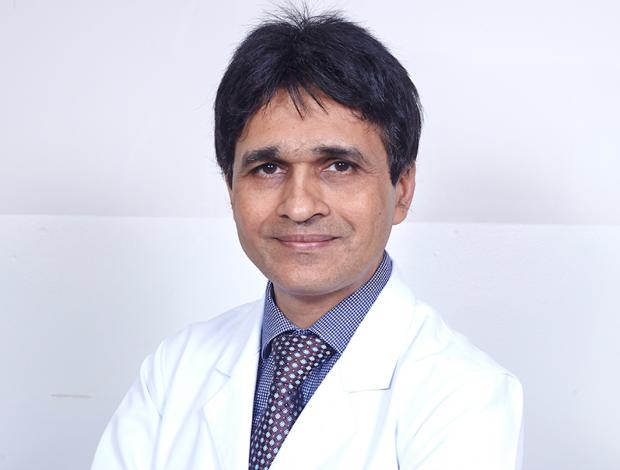About the Doctor
Dr. Srinivas Rajagopala has more than 19 years of experience in Pulmonology and Intensive Care. He has gained experience in Pulmonology, Intensive Care and Transplant Pulmonology in several reputed teaching institutes Nationally and Internationally such as PGIMER, Chandigarh, JIPMER, Puducherry, Royal Adelaide Hospital, McMaster University, Hamilton and Toronto General Hospital.
His areas of interest include inducing tolerance post-transplantation, prevention and management of humoral and cellular rejection, prevention of infectious diseases after lung transplantation and optimizing/matching donor-recipient factors to minimise chronic lung allograft dysfunction (CLAD). With specific interest in Interstitial lung diseases and on Indian data on wait-list mortality, with an aim to reduce the same, he has authored various papers in renowned national and international medical journals.
Specialization
- Heart & Lung Transplant, Lung Transplant
Awards
- Mentee of “Health Research Methodology” under aegis of NHLBI, USA, in Bangalore CoE, India 2009-2011
- Winner of American Society of Clinical Oncology-International Development Education Award Award 2017
- Mentee of MECOR India (Methods in Epidemiologic, Clinical and Operations Research) Program 2018-2019 under the aegis of American Thoracic Society.
- Mentee of MECOR India Part 2 in 2020 (Methods in Epidemiologic, Clinical and Operations Research) Program under the aegis of American Thoracic Society.
- Completed the prestigious Lung transplant fellowship at Toronto General, Ontario, Canada in 2020.
Frequently Asked Questions About Pulmonology
What is Pulmonary (Lung) Function Test?
PFT measures how much air you can breathe in and out and how fast you can do it and how well your lungs are working to deliver oxygen to your blood. PFT is a painless test and a technician will ask you to take a deep breath and then blow as hard as you can into a tube connected to PFT machine.
PFT is the most important test for the diagnosis and management of COPD. PFT is similar to ECG of the lungs.
What all conditions do Pulmonologist Treat?
COPD, Asthma, Tuberculosis, ILD (Interstitial Lung Disease), Respiratory Failure, Lung Cancer, Sleep Apnea syndrome (OSAHS), Snoring, Pleural Effusions, Pneumothorax, Pulmonary infections, Sarcoidosis, Hemoptysis (coughing out blood), Lymph nodes (glands)/ Masses in the chest
Is asthma Fatal?
Asthma, if not taken care of or controlled properly can prove to be fatal. Studies have shown that people who died of asthma, one third of them had mild disease. Thus, it is very important to keep your asthma in check and try and reduce your exposure to polluted air as much as possible.
When is Asthma Alarming?
Asthma can be caused by exposure to dust, pollens, cockroaches, house mites, air pollutants, perfumes, smoke and viral infections. It can be life threatening for some people and may require intervention. Few alarming symptoms are:
- Breathing in hard that the abdomen is sucked inside the ribs
- Gasping for air
- Difficulty in speaking
When to see the doctor for Asthma?
hen the air passage between the mouth, nose and lungs gets interrupted and there is inflammation or swelling of bronchial tubes, you might be suffering from serious bronchitis. A prolonged cough and cold can lead to acute bronchitis in children, while older adults can be also face problems in breathing if medical intervention is not taken on time. You need to visit the doctor if:
- You are having high fever- more than 101 degrees
- Difficulty in sleeping
- Coughing up blood
- Gasping for breath
- You are producing any discolored mucus
How will I know if I am suffering from Sleep apnea?
Sleep apnea is one of the most common disorders that often go undiagnosed. Sleep apnea should not be overlooked because its symptoms are so broad that it can interrupt your hard day at work and can lead to serious complications. The most common symptoms are:
- Waking up with sore or dry throat
- Loud snoring
- Occasionally waking up with a choking or gasping sensation
- Sleepiness or lack of energy during the day
- Sleepiness while driving
- Morning headaches
- Restless sleep
- Forgetfulness and mood changes
In addition to this, Obstructive Sleep Apnea (OSA) can have a negative impact on your health and can cause:
- Heart attack and Blood Pressure
- Diabetes
- Lead to Weight Gain
- Depression
- Aging of Skin












